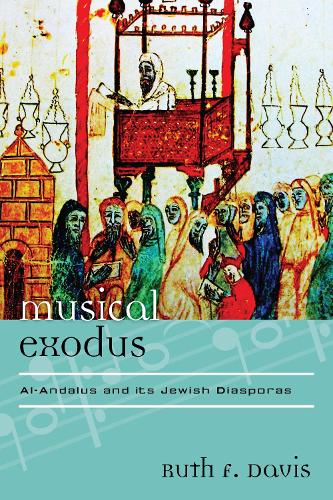
Musical Exodus: Al-Andalus and Its Jewish Diasporas
(Hardback)
Publishing Details
Musical Exodus: Al-Andalus and Its Jewish Diasporas
By (Author) Ruth F. Davis
Bloomsbury Publishing PLC
Rowman & Littlefield Publishers
17th September 2015
United States
Classifications
Professional and Scholarly
Non Fiction
Music reviews and criticism
Sacred and religious music
780.89924
Physical Properties
Hardback
258
Width 162mm, Height 232mm, Spine 24mm
522g
Description
For nearly eight centuries from the Muslim conquest of Spain in 711 to the final expulsion of the Jews in 1492 Muslims, Jews and Christians shared a common Andalusian culture under alternating Muslim and Christian rule. Following their expulsion, the Spanish and Arabic- speaking Jews joined pre-existing diasporic communities and established new ones across the Mediterranean and beyond. In the twentieth century, radical social and political upheavals in the former Ottoman and European-occupied territories led to the mass exodus of Jews from Turkey and the Arab Mediterranean, with the majority settling in Israel. Following a trajectory from medieval Al-Andalus to present-day Israel via North Africa, Italy, Turkey and Syria, pausing for perspectives from Enlightenment Europe,Musical Exodus: Al-Andalus and its Jewish Diasporastells of diverse song and instrumental traditions born of the multiple musical encounters between Jews and their Muslim and Christian neighbors in different Mediterranean diasporas, and the revival and renewal of those traditions in present-day Israel. In this collection of essays from Philip V. Bohlman, Daniel Jtte, Tony Langlois, Piergabriele Mancuso, John OConnell, Vanessa Paloma, Carmel Raz, Dwight Reynolds, Edwin Seroussi, and Jonathan Shannon, with opening and closing contributions by Ruth F. Davis and Stephen Blum, distinguished ethnomusicologists, cultural historians, linguists and performers explore from multidisciplinary perspectives the complex and diverse processes and conditions of intercultural and intracultural musical encounters. The authors consider how musical traditions acquired new functions and meanings in different social, political and diasporic contexts; explore the historical role of Jewish musicians as cultural intermediaries between the different faith communities; and examine how music is implicated in projects of remembering and forgetting as societies come to terms with mass exodus by reconstructing their narratives of the past. The essays inMusical Exodus: Al-Andalus and its Jewish Diasporasextend beyond the music of medieval Iberia and its Mediterranean Jewish diasporas to wider aspects of Jewish-Christian and Jewish-Muslim relations. The authors offer new perspectives on theories of musical interaction, hybridization, and the cultural meaning of musical expression in diasporic and minority communities. The essays address how music is implicated in constructions of ethnicity and nationhood and of myth and history, while also examining the resurgence of Al-Andalus as a symbol in musical projects that claim to promote cross-cultural understanding and peace. The diverse scholarship in Musical Exodus makes a vital contribution to scholars of music and European and Jewish history.
Reviews
The books expansive timeframe, dispersed geographies, and widely varied musical traditions paint a composite portraitby way of case studyof a vibrant and multi-layered areaof Jewish music, history, and culture. * Thinking On Music *
Author Bio
Ruth F. Davis is University Reader in Ethnomusicology and Fellow and Director of Studies in Music at Corpus Christi College, University of Cambridge. She has published extensively on the music of North Africa, the Middle East and the wider Mediterranean, especially on her fieldwork in mainland Tunisia and in the Jewish community of Djerba, and on Robert Lachmann's archive projects in Mandatory Palestine. Her edition of Lachmann's "Oriental Music" broadcasts was published by A-R Editions in 2013, with accompanying CD set of digitally restored recordings.
